微控制器入門第二課----點燈大師
引言
在上一部落格中,我們正式開始了微控制器的學習之路,講了微控制器的概念,以及我們使用的ESP32系列的微控制器的IO引腳,講了什麼是GPIO,以及相關的匯流排通訊概念(UART,IIC,SPI),脈衝調變概念(PWM),以及訊號數位互轉的(ADC和DAC),板子自帶的一些功能,在今天的部落格中,我會帶你們正式進入控制硬體的第一課;
不管是什麼微控制器,入門第一課都是點亮LED燈,俗稱「點燈大師」,哈哈,我們的第一課也是點燈,那我在群裡,沒有讓大家去購買LED,是因為我們實際上可以使用程式碼去控制ESP板子上面的其中一個LED燈管,當電源接通後會有一個電源燈,紅色的燈亮起,電源正常,同時還有一個燈為藍色的,預設為不顯示的,接下來我們便讓ESP32開發板的另外一個LED燈進行閃爍。
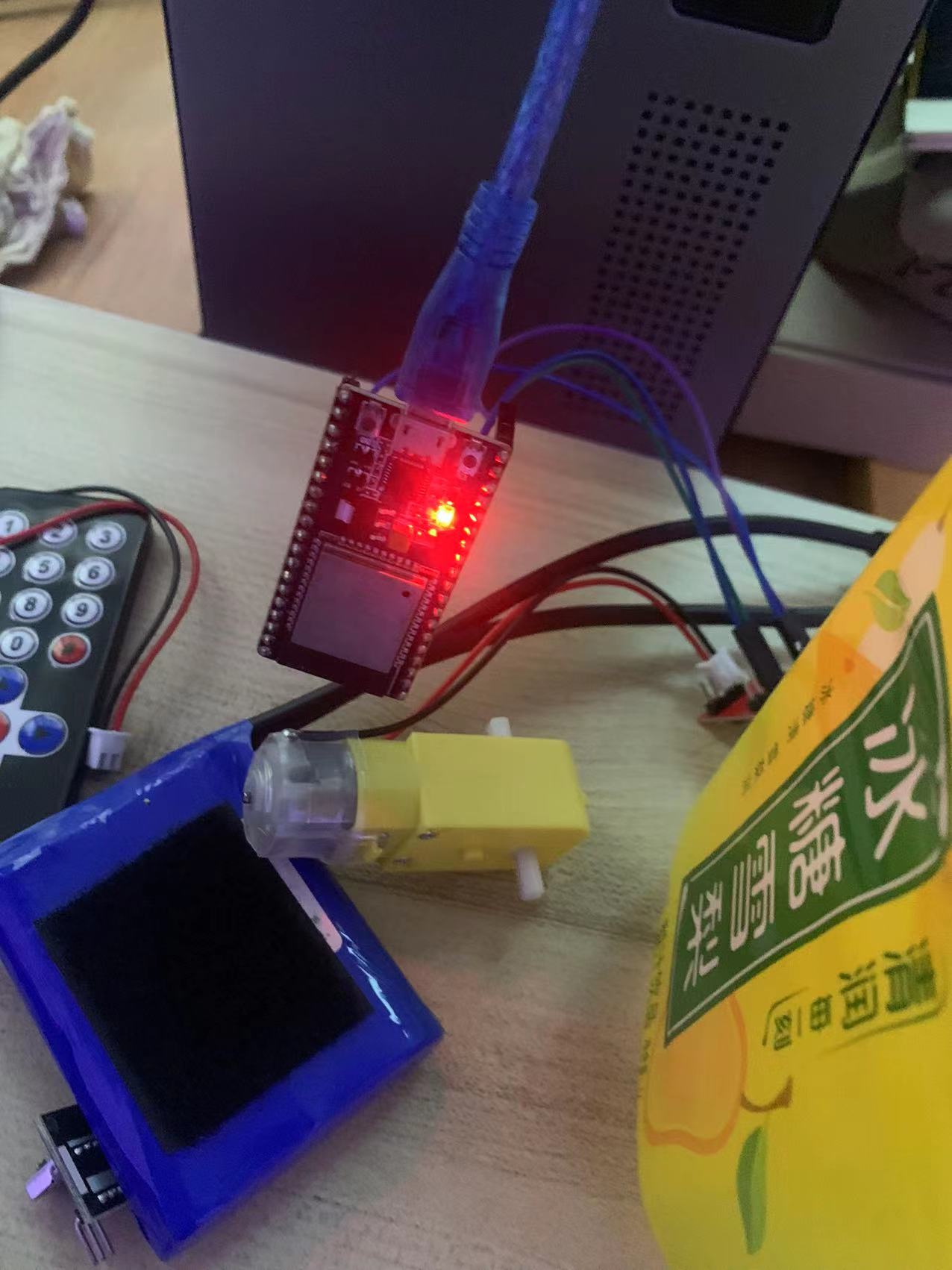
點燈
void setup() {
// put your setup code here, to run once:
pinMode(2,OUTPUT);
}
void loop() {
digitalWrite(2, HIGH); // sets the LED on
delay(1000); // waits for a second
digitalWrite(2, LOW); // sets the LED off
delay(1000);
}
先上程式碼,如上所示,即可點亮板子的另一個藍色的燈,先講一下程式碼,上面的setup,一個微控制器通電,只會執行一次,即每通電一次,執行一次,下面的loop是迴圈的一個程式碼,通電期間,一直迴圈,先執行setup,在執行loop,上面的setup顧名思義,是用來對微控制器做一些設定,上面的設定就是將第二個引腳設定為輸出,即微控制器向引腳2輸出,輸出高低電平,用來點亮LED燈,在ESP32中,藍色燈的引腳為2,所以在此處我們設定引腳2為輸出模式,
第二個loop迴圈程式碼,第一行呼叫了一個digitalWrite的方法,這個方法是給我們指定的引腳寫入高低電平,以此來給某個引腳開關通電,斷電,第一個引數為要寫入的引腳的pin值,即引腳值,第二個引數為需要寫入的值,HIGH,LOW這兩個為高低電平,HIGH通電,LOW斷電,第二行程式碼,則是一個延遲函數,裡面的值是毫秒值,1000,即代表暫停一秒
下面的gif展示了我們這次的一個執行結果,可以看到藍色燈在不停的進行閃爍。
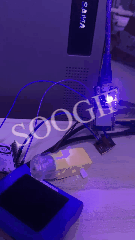
Arduino
我們的開發IDE為Arduino,我之前配過vsc使用純c語言去進行開發ESP32微控制器,後面使用了Arduino,因為這個相比於純c來說更簡單一些,更適合入門,但是對於C開發,原理也是一樣的,無非就是寫法上純在差異。
在程式執行都是不停的在進行迴圈程式碼,但是方法上一個是main方法,一個是loop其他的就是語法的區別了,Arduino是基於c和c++進行封裝的,裡面的封裝更趨近於高階語言,這裡展示一下Arduino的一些方法或者常數,資料型別等。
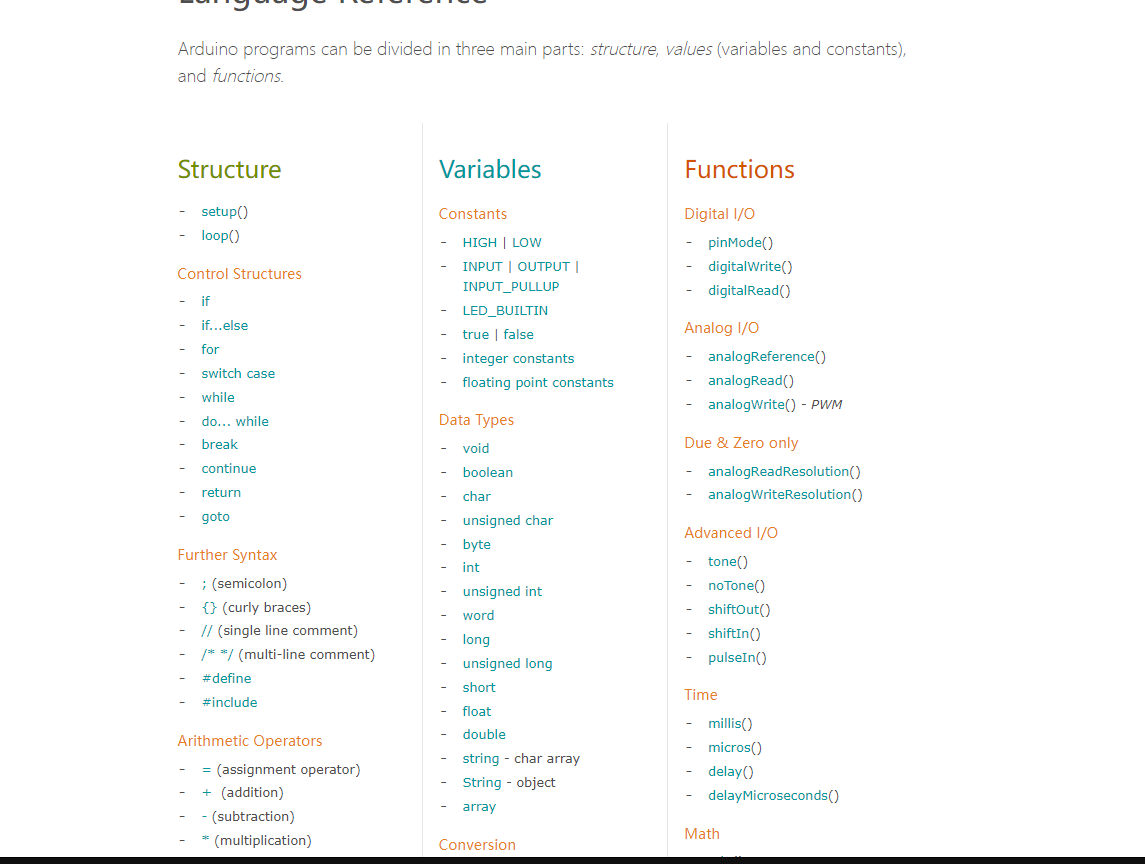
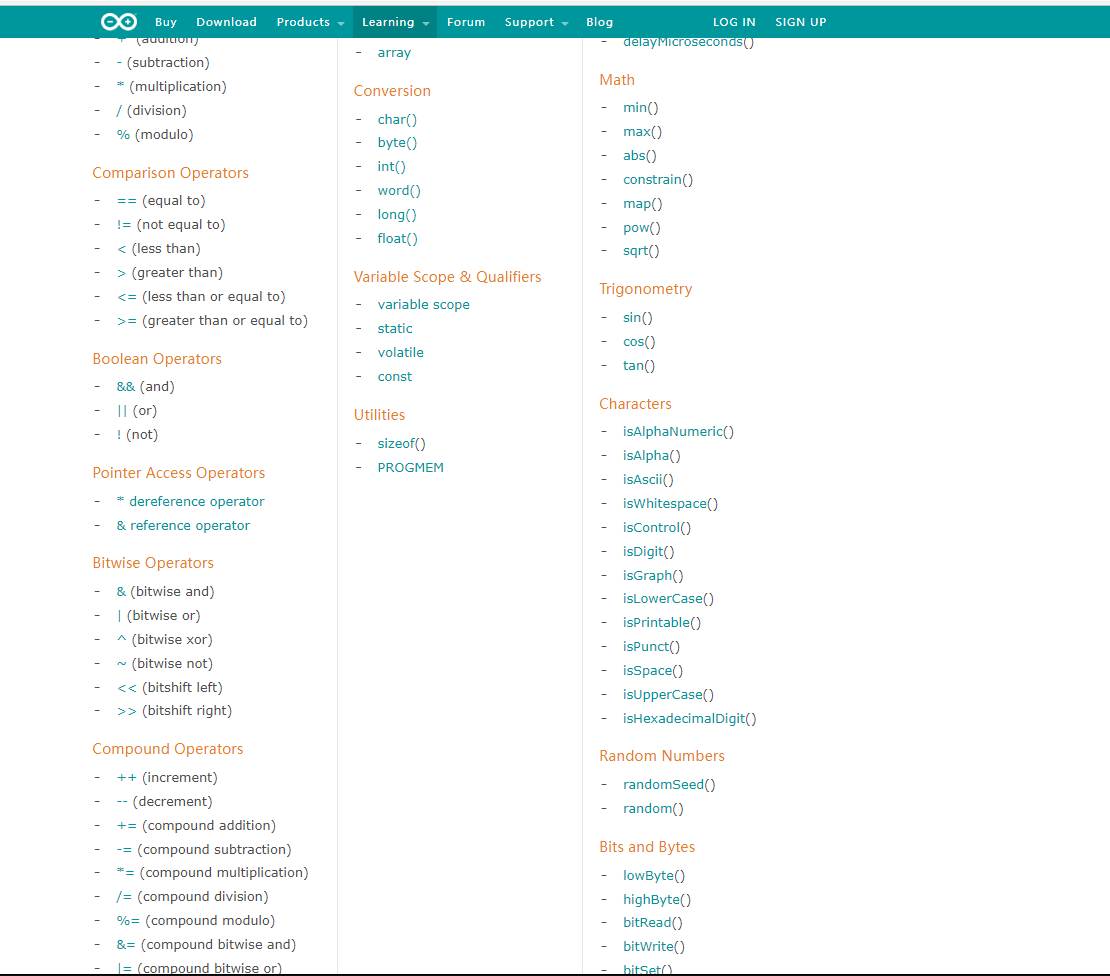
C語言
而對於c語言來說,有的基礎不好,或者沒有深入使用過c語言的來講是有一些難度的,我在這裡貼一下我之前寫的一個紅外線控制智慧小車的程式碼,此處使用的是esp32原生的c檔案來進行開發,其複雜程度和Arduino相比還是略現複雜。
/* brushed dc motor control example
This example code is in the Public Domain (or CC0 licensed, at your option.)
Unless required by applicable law or agreed to in writing, this
software is distributed on an "AS IS" BASIS, WITHOUT WARRANTIES OR
CONDITIONS OF ANY KIND, either express or implied.
*/
/*
* This example will show you how to use MCPWM module to control brushed dc motor.
* This code is tested with L298 motor driver.
* User may need to make changes according to the motor driver they use.
*/
#include <stdio.h>
#include "sdkconfig.h"
#include <string.h>
#include "freertos/FreeRTOS.h"
#include "freertos/task.h"
#include "esp_attr.h"
#include "driver/rmt.h"
#include "driver/mcpwm.h"
#include "soc/mcpwm_periph.h"
#include "IR_Rev.h"
// const static char *TAG = "IR_Rre Demo";
#define RECV_PIN 23 // 一體化紅外接收頭GPIO
uint8_t command = 0; // 接收到的ENC紅外指令
int direction = 0;
float currentspeed = 0;
int currentcolor = 2;
#define GPIO_PWM0A_OUT 15 // Set GPIO 15 as PWM0A
#define GPIO_PWM0B_OUT 16 // Set GPIO 16 as PWM0B
#define GPIO_PWM1A_OUT 17
#define GPIO_PWM1B_OUT 18
#define GPIO_PWM2A_OUT 12 // Set GPIO 15 as PWM0A
#define GPIO_PWM2B_OUT 14 // Set GPIO 16 as PWM0B
#define GPIO_PWM3A_OUT 25
#define GPIO_PWM3B_OUT 26
#define RED 2
#define GREEN 4
#define BLUE 5
#define INFARE 21
static void mcpwm_example_gpio_initialize(void)
{
printf("initializing mcpwm gpio...\n");
mcpwm_gpio_init(MCPWM_UNIT_0, MCPWM0A, GPIO_PWM0A_OUT);
mcpwm_gpio_init(MCPWM_UNIT_0, MCPWM0B, GPIO_PWM0B_OUT);
mcpwm_gpio_init(MCPWM_UNIT_0, MCPWM1A, GPIO_PWM1A_OUT);
mcpwm_gpio_init(MCPWM_UNIT_0, MCPWM1B, GPIO_PWM1B_OUT);
mcpwm_gpio_init(MCPWM_UNIT_1, MCPWM0A, GPIO_PWM2A_OUT);
mcpwm_gpio_init(MCPWM_UNIT_1, MCPWM0B, GPIO_PWM2B_OUT);
mcpwm_gpio_init(MCPWM_UNIT_1, MCPWM1A, GPIO_PWM3A_OUT);
mcpwm_gpio_init(MCPWM_UNIT_1, MCPWM1B, GPIO_PWM3B_OUT);
}
// forwards he forward 替換實現順時針吹風和逆時針吹風
/**
* @brief motor moves in forward direction, with duty cycle = duty %
*/
static void brushed_motor_forward(mcpwm_unit_t mcpwm_num, mcpwm_timer_t timer_num, float duty_cycle)
{
mcpwm_set_signal_low(mcpwm_num, timer_num, MCPWM_OPR_A);
mcpwm_set_duty(mcpwm_num, timer_num, MCPWM_OPR_B, duty_cycle);
mcpwm_set_duty_type(mcpwm_num, timer_num, MCPWM_OPR_B, MCPWM_DUTY_MODE_0); // call this each time, if operator was previously in low/high state
}
static void brushed_motor_forwards(mcpwm_unit_t mcpwm_num, mcpwm_timer_t timer_num, float duty_cycle)
{
ESP_ERROR_CHECK(mcpwm_set_signal_low(mcpwm_num, timer_num, MCPWM_OPR_B));
ESP_ERROR_CHECK(mcpwm_set_duty(mcpwm_num, timer_num, MCPWM_OPR_A, duty_cycle));
ESP_ERROR_CHECK(mcpwm_set_duty_type(mcpwm_num, timer_num, MCPWM_OPR_A, MCPWM_DUTY_MODE_0)); // call this each time, if operator was previously in low/high state
}
// forwards he forward 替換實現順時針吹風和逆時針吹風
/**
* @brief motor moves in forward direction, with duty cycle = duty %
*/
static void brushed_motor_backward(mcpwm_unit_t mcpwm_num, mcpwm_timer_t timer_num, float duty_cycle)
{
mcpwm_set_signal_low(mcpwm_num, timer_num, MCPWM_OPR_B);
mcpwm_set_duty(mcpwm_num, timer_num, MCPWM_OPR_A, duty_cycle);
mcpwm_set_duty_type(mcpwm_num, timer_num, MCPWM_OPR_A, MCPWM_DUTY_MODE_0); // call this each time, if operator was previously in low/high state
}
static void brushed_motor_backwards(mcpwm_unit_t mcpwm_num, mcpwm_timer_t timer_num, float duty_cycle)
{
ESP_ERROR_CHECK(mcpwm_set_signal_low(mcpwm_num, timer_num, MCPWM_OPR_A));
ESP_ERROR_CHECK(mcpwm_set_duty(mcpwm_num, timer_num, MCPWM_OPR_B, duty_cycle));
ESP_ERROR_CHECK(mcpwm_set_duty_type(mcpwm_num, timer_num, MCPWM_OPR_B, MCPWM_DUTY_MODE_0)); // call this each time, if operator was previously in low/high state
}
/**
* @brief motor stop
*/
static void brushed_motor_stop(mcpwm_unit_t mcpwm_num, mcpwm_timer_t timer_num)
{
mcpwm_set_signal_low(mcpwm_num, timer_num, MCPWM_OPR_A);
mcpwm_set_signal_low(mcpwm_num, timer_num, MCPWM_OPR_B);
}
static void setspeed(uint8_t command)
{
if ((uint8_t)command == 22)
{
printf("%d\n", 22);
currentspeed = 10;
}
else if ((uint8_t)command == 12)
{
printf("%d\n", 12);
currentspeed = 20;
}
else if ((uint8_t)command == 24)
{
printf("%d\n", 24);
currentspeed = 30;
}
else if ((uint8_t)command == 94)
{
printf("%d\n", 94);
currentspeed = 40;
}
else if ((uint8_t)command == 8)
{
printf("%d\n", 8);
currentspeed = 50;
}
else if ((uint8_t)command == 28)
{
printf("%d\n", 28);
currentspeed = 60;
}
else if ((uint8_t)command == 90)
{
printf("%d\n", 90);
currentspeed = 70;
}
else if ((uint8_t)command == 66)
{
printf("%d\n", 66);
currentspeed = 80;
}
else if ((uint8_t)command == 82)
{
printf("%d\n", 82);
currentspeed = 90;
}
else if ((uint8_t)command == 74)
{
printf("%d\n", 74);
currentspeed = 100;
}
}
static void head(float speed)
{
brushed_motor_forward(MCPWM_UNIT_0, MCPWM_TIMER_0, speed);
brushed_motor_forwards(MCPWM_UNIT_0, MCPWM_TIMER_1, speed);
brushed_motor_forward(MCPWM_UNIT_1, MCPWM_TIMER_0, speed);
brushed_motor_forwards(MCPWM_UNIT_1, MCPWM_TIMER_1, speed);
}
static void last(float speed)
{
brushed_motor_backward(MCPWM_UNIT_0, MCPWM_TIMER_0, speed);
brushed_motor_backwards(MCPWM_UNIT_0, MCPWM_TIMER_1, speed);
brushed_motor_backward(MCPWM_UNIT_1, MCPWM_TIMER_0, speed);
brushed_motor_backwards(MCPWM_UNIT_1, MCPWM_TIMER_1, speed);
}
static void left(float speed)
{
mcpwm_set_signal_low(MCPWM_UNIT_0, MCPWM_TIMER_1, MCPWM_OPR_A);
mcpwm_set_signal_low(MCPWM_UNIT_1, MCPWM_TIMER_0, MCPWM_OPR_B);
}
static void right(float speed)
{
mcpwm_set_signal_low(MCPWM_UNIT_0, MCPWM_TIMER_0, MCPWM_OPR_B);
mcpwm_set_signal_low(MCPWM_UNIT_1, MCPWM_TIMER_1, MCPWM_OPR_A);
}
/**
* @brief Configure MCPWM module for brushed dc motor
*/
static void mcpwm_example_brushed_motor_control(void *arg)
{
// 1. mcpwm gpio initialization
mcpwm_example_gpio_initialize();
// 2. initial mcpwm configuration
printf("Configuring Initial Parameters of mcpwm...\n");
mcpwm_config_t pwm_config;
pwm_config.frequency = 1000; // frequency = 500Hz,
pwm_config.cmpr_a = 0; // duty cycle of PWMxA = 0
pwm_config.cmpr_b = 0; // duty cycle of PWMxb = 0
pwm_config.counter_mode = MCPWM_UP_COUNTER;
pwm_config.duty_mode = MCPWM_DUTY_MODE_0;
ESP_ERROR_CHECK(mcpwm_init(MCPWM_UNIT_0, MCPWM_TIMER_0, &pwm_config)); // Configure PWM0A & PWM0B with above settings
mcpwm_config_t pwm_configs;
pwm_configs.frequency = 1000; // frequency = 500Hz,
pwm_configs.cmpr_a = 0; // duty cycle of PWMxA = 0
pwm_configs.cmpr_b = 0; // duty cycle of PWMxb = 0
pwm_configs.counter_mode = MCPWM_UP_COUNTER;
pwm_configs.duty_mode = MCPWM_DUTY_MODE_0;
ESP_ERROR_CHECK(mcpwm_init(MCPWM_UNIT_0, MCPWM_TIMER_1, &pwm_configs)); // Configure PWM0A & PWM0B with above settings
mcpwm_config_t pwm_configA;
pwm_configA.frequency = 1000; // frequency = 500Hz,
pwm_configA.cmpr_a = 0; // duty cycle of PWMxA = 0
pwm_configA.cmpr_b = 0; // duty cycle of PWMxb = 0
pwm_configA.counter_mode = MCPWM_UP_COUNTER;
pwm_configA.duty_mode = MCPWM_DUTY_MODE_0;
ESP_ERROR_CHECK(mcpwm_init(MCPWM_UNIT_1, MCPWM_TIMER_0, &pwm_configA)); // Configure PWM0A & PWM0B with above settings
mcpwm_config_t pwm_configAs;
pwm_configAs.frequency = 1000; // frequency = 500Hz,
pwm_configAs.cmpr_a = 0; // duty cycle of PWMxA = 0
pwm_configAs.cmpr_b = 0; // duty cycle of PWMxb = 0
pwm_configAs.counter_mode = MCPWM_UP_COUNTER;
pwm_configAs.duty_mode = MCPWM_DUTY_MODE_0;
ESP_ERROR_CHECK(mcpwm_init(MCPWM_UNIT_1, MCPWM_TIMER_0, &pwm_configAs)); // Configure PWM0A & PWM0B with above settings */ */
while (1)
{
command = IRrecvReadIR();
printf("IR Command is %02X\n", command);
printf("IR 111 is %d\n", (uint8_t)command);
if ((uint8_t)command == 69)
{
brushed_motor_stop(MCPWM_UNIT_0, MCPWM_TIMER_0);
brushed_motor_stop(MCPWM_UNIT_0, MCPWM_TIMER_1);
brushed_motor_stop(MCPWM_UNIT_1, MCPWM_TIMER_0);
brushed_motor_stop(MCPWM_UNIT_1, MCPWM_TIMER_1);
}
else if ((uint8_t)command == 64)
{
direction = 64;
head(currentspeed);
}
else if ((uint8_t)command == 25)
{
direction = 25;
last(currentspeed);
}
else if ((uint8_t)command == 7)
{
printf("IR 32 is %d\n", (uint8_t)command);
left(currentspeed);
}
else if ((uint8_t)command == 9)
{
printf("IR 23 is %d\n", (uint8_t)command);
right(currentspeed);
}
else
{
printf(" %d\n", direction);
setspeed(command);
if (direction == 64)
{
head(currentspeed);
}
else if (direction == 25)
{
last(currentspeed);
}
}
}
}
static void openlight(void *arg)
{
gpio_set_level(INFARE, 1);
while (1)
{
gpio_set_level(currentcolor, 1);
vTaskDelay(200 / portTICK_PERIOD_MS);
gpio_set_level(currentcolor, 0);
if(currentcolor==2)
{
currentcolor=4;
}
else if (currentcolor==4)
{
currentcolor=5;
}
else if (currentcolor==5)
{
currentcolor=2;
}
}
}
void app_main(void)
{
IRrecvInit(RECV_PIN, 3);
gpio_set_direction(INFARE, GPIO_MODE_OUTPUT);
gpio_set_direction(RED, GPIO_MODE_OUTPUT);
gpio_set_direction(GREEN, GPIO_MODE_OUTPUT);
gpio_set_direction(BLUE, GPIO_MODE_OUTPUT);
xTaskCreate(mcpwm_example_brushed_motor_control, "mcpwm_examlpe_brushed_motor_control", 4096, NULL, 5, NULL);
xTaskCreate(openlight, "openlight", 4096, NULL, 5, NULL);
}
而令我最喜歡Arduino的一點是,我們需要使用一些第三方庫的時候,這裡的擴充套件相比VSC更容易找一些,C的話在外掛市場極大可能找不到,需要在網上自己搜尋,找到c語言寫好的檔案,然後include進來再去使用,找的話有點難度,對於紅外線來講,上次我在網上找就找了挺久的一段時間。而在Arduino我只需在管理庫介面搜尋我想要的庫或者關鍵字都可以找到,emmm,我覺得就像nuget一樣簡單,哈哈,所以我更喜歡用這個一點。
在這裡,我們就可以根據關鍵字,型別去搜尋我們想要的第三方庫,很方便,同時有的第三方庫也是有例子可以直接使用,總體來說,作為簡單入門,Arduino還是很不錯的一個選擇。
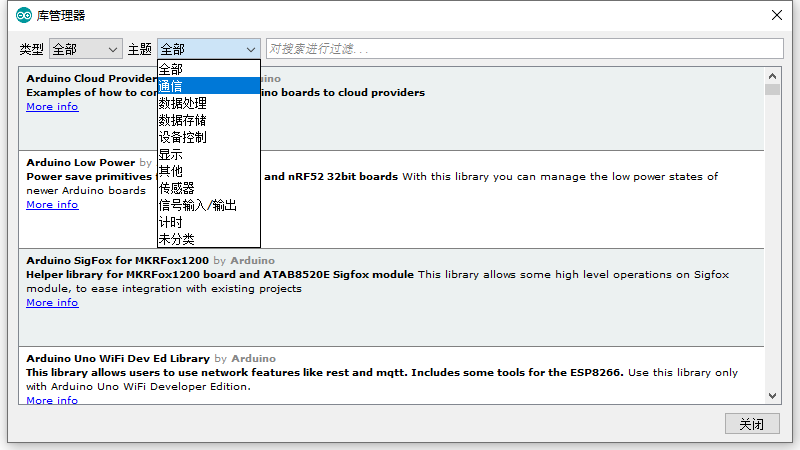
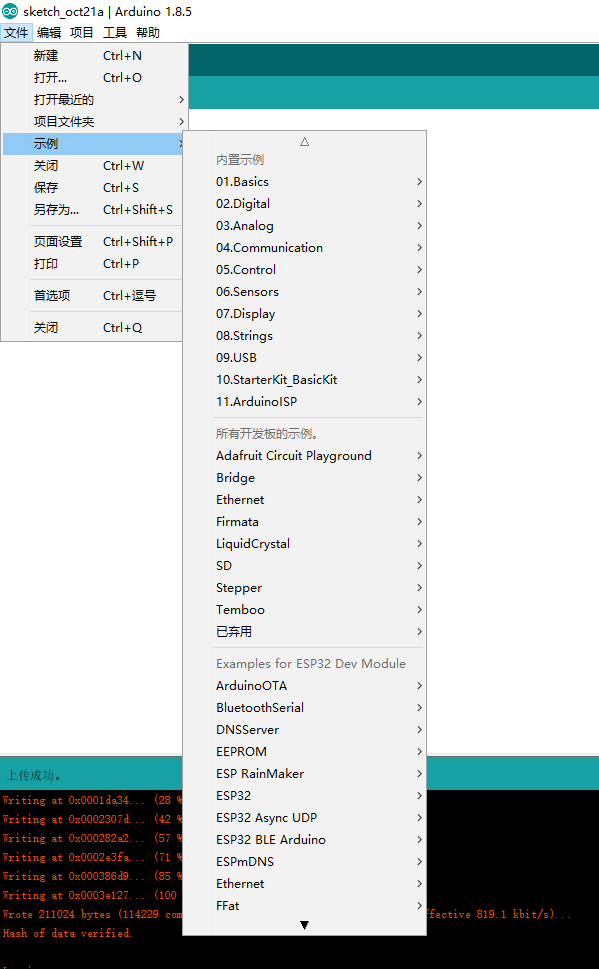
結語
好啦,今天的點燈第一課就到這裡啦,如果又不懂的可以隨時問我,可以加這個群一起來學習微控制器,後面還會開stm32系列的課程,IDE的話可以看上一篇部落格中的下載地址是有百度網路硬碟的地址,同時群檔案也有,有需要的可以下載啦,我們系列教學會出到可以自己做一個智慧小車為止。
